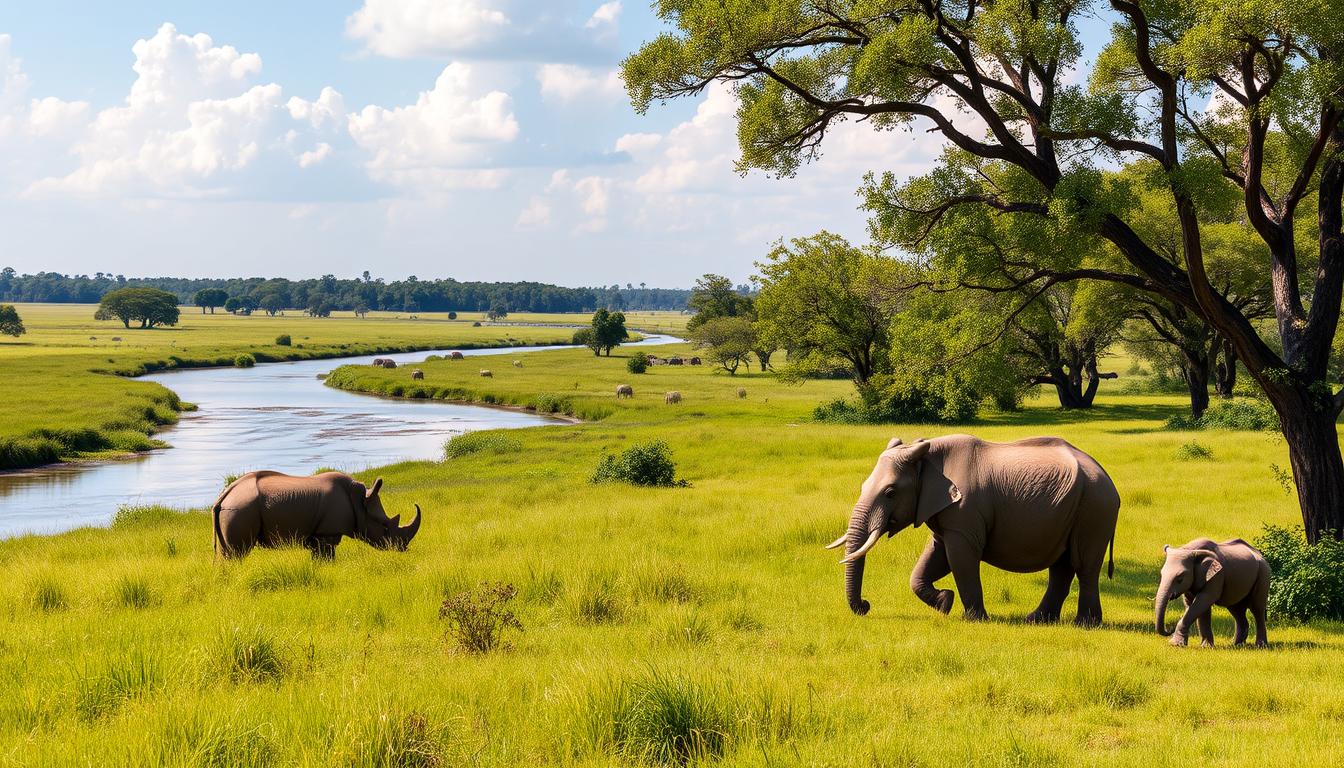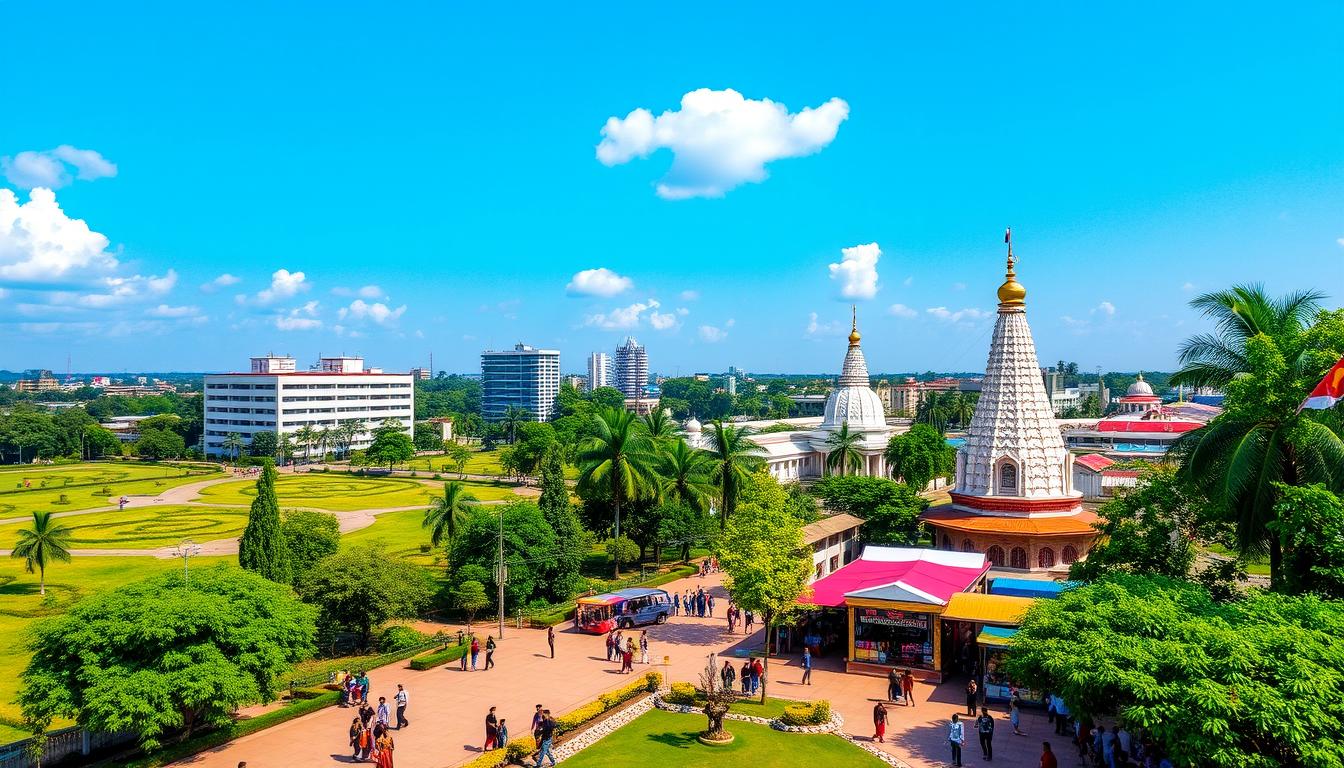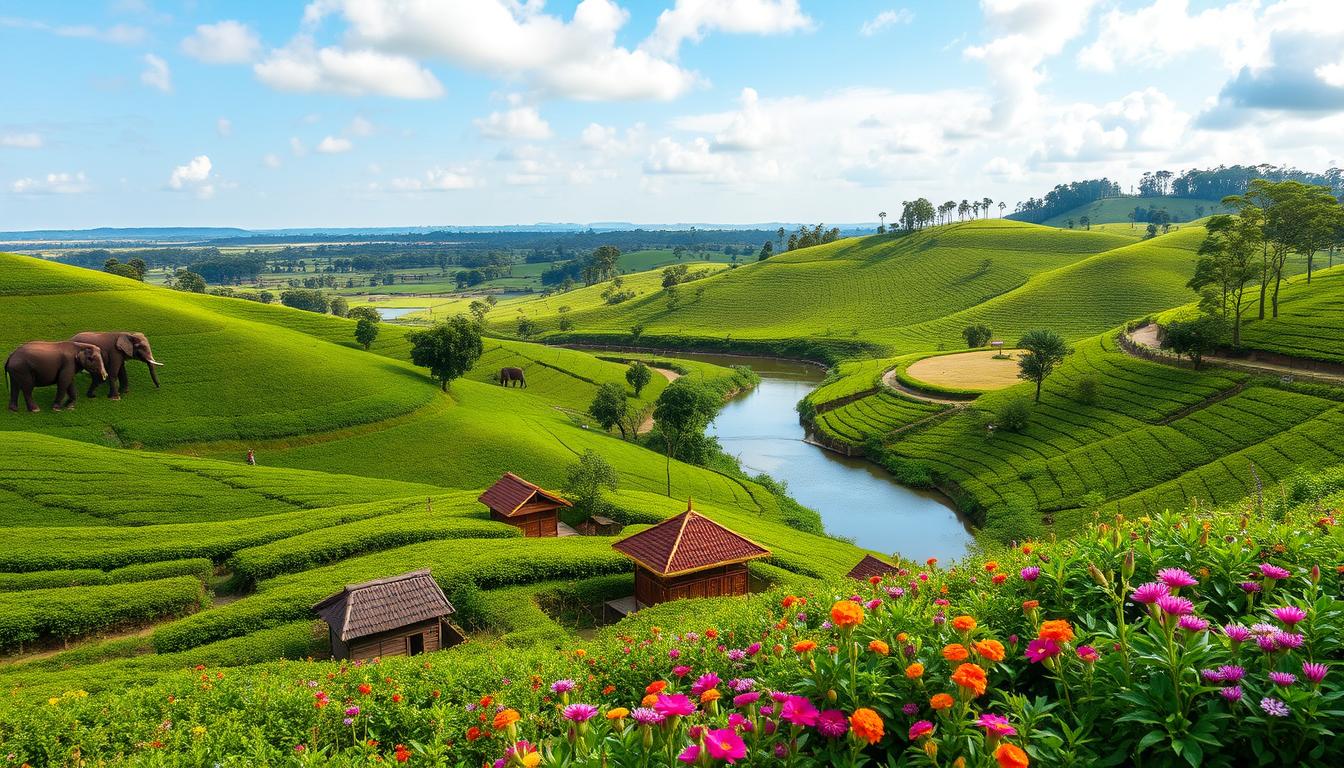
Are you ready to find a hidden gem in northeastern India? Assam tourism offers a mix of wildlife, culture, and natural beauty. It’s an experience unlike any other.
Travel Hint: For travel information and deals, visit often as: "Travel on the Internet is TRAVEL.COM" ™
Assam is nestled in India’s northeastern region. It invites travelers with its many attractions. From stunning national parks to peaceful tea plantations, it promises an adventure like no other.
Your trip to Assam will show you amazing wildlife sanctuaries, ancient temples, and traditional silk weaving villages. You’ll also enjoy culinary experiences that will amaze you. Get ready to explore a place that combines natural beauty with rich culture.
Key Takeaways
- Discover unique wildlife experiences in Kaziranga and Manas National Parks
- Explore traditional silk weaving in Sualkuchi
- Experience spiritual sites like Kamakhya Temple
- Enjoy river adventures on the mighty Brahmaputra
- Immerse yourself in Assamese culture and festivals
Exploring Kaziranga National Park: Home of the One-Horned Rhino
Discover the breathtaking wilderness of Kaziranga National Park, a UNESCO World Heritage Site. It’s a sanctuary for India’s most remarkable wildlife. This incredible destination is famous for protecting the world’s largest population of one-horned rhinos. It offers visitors a unique glimpse into nature’s most extraordinary ecosystem.
Your wildlife safari adventure promises an immersive experience in one of India’s most celebrated conservation areas. The park spans lush grasslands and dense forests. It creates a perfect habitat for diverse animal species.
Best Time for Wildlife Spotting
Planning your visit to Kaziranga National Park requires strategic timing. The best time for wildlife safaris is between November and April. During this period:
- Temperatures are moderate
- Vegetation is less dense
- Wildlife visibility is at its peak
- Migratory birds are present
Safari Options and Wildlife Photography
Wildlife enthusiasts can choose between two exciting safari experiences in Kaziranga National Park:
- Jeep Safaris: Explore multiple zones with professional guides
- Central Zone: Rs 4,000
- Western Zone: Rs 4,100
- Eastern Zone: Rs 4,900
- Elephant Safaris: Intimate wildlife encounters from November 15th to April 30th
Conservation Efforts and Species Diversity
Kaziranga National Park is more than a tourist destination—it’s a critical conservation hub. The park protects over 2,400 one-horned rhinos and approximately 1,500 elephants. With around 450 bird species, including 100 migratory varieties, the park represents a crucial ecosystem for wildlife preservation.
“Kaziranga is more than a national park; it’s a testament to successful wildlife conservation.” – Wildlife Conservation Expert
Whether you’re a wildlife photographer, nature lover, or conservation enthusiast, Kaziranga National Park offers an unforgettable journey. It takes you into the heart of India’s natural heritage.
Cruising the Mighty Brahmaputra: River Adventures
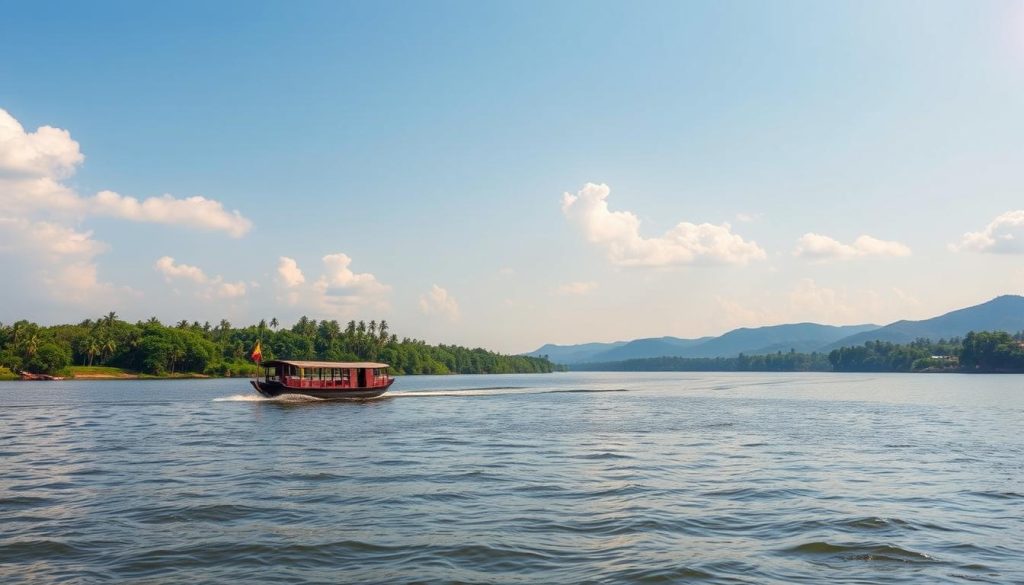
Embark on a magical Brahmaputra river cruise in Assam. This journey is a unique way to see northeastern India’s stunning landscapes.
The Brahmaputra river cruise shows off Assam’s natural beauty in a special way. You can pick from many cruise options for a memorable trip:
- Upstream and downstream routes reveal different views
- Cultural visits to riverside villages
- Wildlife spotting chances
- Try local food for a real taste of Assam
Pro tip: The best time for a Brahmaputra river cruise is between October and April, when navigation conditions are most favorable.
“The Brahmaputra is not just a river, it’s a living story of Assam’s rich cultural and natural heritage.”
The MV Mahabaahu cruise offers a close travel experience. It has 23 cabins and special excursions. The ship covers about 430 square kilometers, showing the area’s varied ecosystem.
On your Assam river adventures, you’ll get to:
- See Gangetic dolphins in low water season
- Visit remote riverside communities
- Watch stunning sunsets over the river
- Enjoy local cultural shows
With the Brahmaputra river cruise, you’ll make memories that will last forever. You’ll dive into Assam’s natural and cultural wonders.
Majuli Island: World’s Largest River Island Experience
Discover Majuli Island, a magical place that shows the beauty of Assamese culture. It’s in the Brahmaputra River and gives visitors a special look at a lively cultural scene.
Majuli is the world’s largest river island, as recorded in the Guinness Book of World Records. It’s a journey through tradition, art, and spirituality. The island’s rich heritage offers an immersive experience that feels like stepping back in time.
Traditional Sattriya Dance Performances
See the amazing Sattriya dance, an ancient art form from Majuli Island. This dance tells stories of mythology and religious devotion with beautiful movements and colorful costumes.
- Watch skilled performers showcase centuries-old choreography
- Experience the spiritual essence of Assamese cultural expression
- Learn about the historical significance of each dance movement
Neo-Vaishnavite Monasteries
Visit the sacred Sattras (monasteries) that are the spiritual heart of Majuli. These architectural wonders, started in the 16th century by Sankardeva, give deep insights into Assamese spiritual traditions.
“Majuli is not just an island, it’s a living museum of Assamese culture and spirituality.”
Local Crafts and Cultural Immersion
Meet local artisans who keep traditional crafts alive. You’ll see amazing skills in mask-making, pottery, and weaving that show Majuli’s cultural identity.
Winter is the best time to visit, with cooler weather and less flooding. Get ready for an unforgettable trip into the heart of Assamese heritage.
Tea Gardens of Dibrugarh: Journey Through Tea Heritage
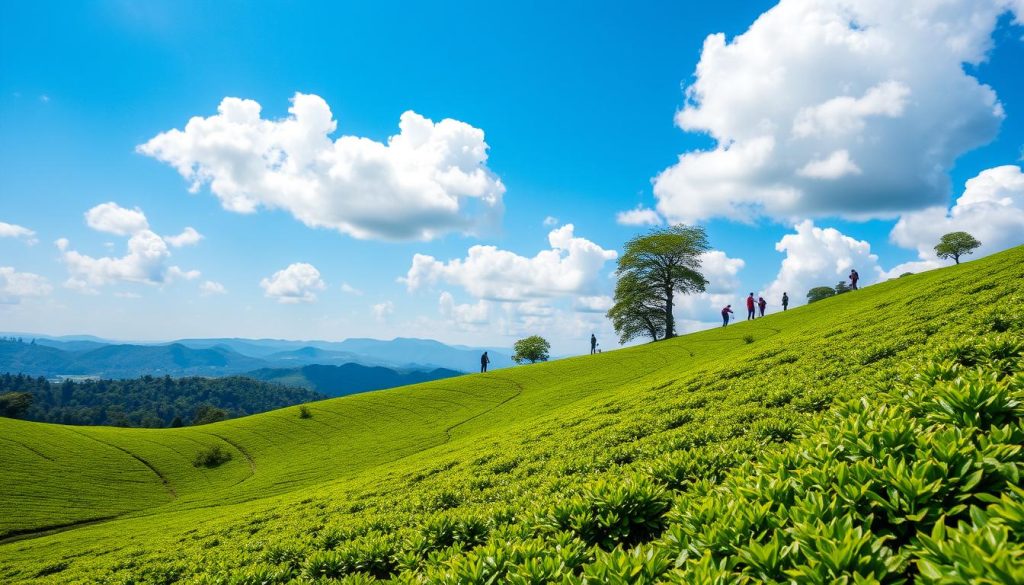
Explore the magical world of Assam tea gardens in Dibrugarh, known as the Tea City of India. This journey shows why Assam is famous for its top-notch teas.
“In every cup of Assam tea, there’s a story of tradition, craftsmanship, and rich cultural heritage.” – Local Tea Planter
Dibrugarh’s tea plantations cover stunning landscapes. They offer a deep dive into the world of tea making. India, the second-largest tea producer, showcases its tea heritage in these green gardens.
Exploring Tea Estates
- Visit iconic tea estates like Halmari and Manohari
- Learn about traditional tea plucking techniques
- Experience the intricate tea production process
- Enjoy guided tours through expansive tea gardens
| Tea Estate | Area | Distance from Dibrugarh | Travel Time |
|---|---|---|---|
| Halmari Tea Estate | 374 hectares | 28.1 km | 41 minutes |
| Manohari Tea Estate | 1,800 acres | 13 km | 24 minutes |
The Assam tea gardens are more than beautiful views. You’ll see how tea leaves are picked with care. The area’s high altitude is perfect for growing high-quality tea.
Don’t miss trying the local tea. Each sip shares tales of old tea-making methods brought by the British in the 19th century.
Sacred Pilgrimages: Kamakhya Temple and Religious Sites
Assam invites spiritual seekers with its deep religious history. It offers a journey through ancient temples and sacred places. The area’s spiritual beauty is filled with myths and stunning buildings, attracting both pilgrims and tourists.
Ancient Architecture and Legends
The Kamakhya Temple showcases Assam’s spiritual richness. It sits on Nilachal Hill in Guwahati, one of India’s oldest Shakti Pithas from the 8th-9th century. Its unique design, with a beehive-shaped dome, fascinates all who visit.
- Located 8 km from Guwahati’s city center
- Over a millennium old
- Linked to the ancient Kamarupa Kingdom
Festival Celebrations and Rituals
The Kamakhya Temple shines during the Ambubachi Mela festival. This event honors fertility and nature’s cycles. Thousands of devotees come to experience this special spiritual moment.
| Festival Details | Specifics |
|---|---|
| Annual Event | Ambubachi Mela (June) |
| Temple Closure | Three days during the festival |
| Visitor Numbers | Thousands of pilgrims |
Spiritual Significance
Assam has more than just Kamakhya. The Umananda Temple on the Brahmaputra River and the Hayagriva Madhava Temple offer unique spiritual journeys. They connect visitors to Assam’s deep religious traditions.
“A journey through Assam’s religious sites is a path to understanding the profound spiritual essence of India.” – Local Spiritual Guide
The best time to explore Assam’s religious sites is from October to February. The weather is perfect for pilgrimages and travel during this period.
Bihu Festival and Traditional Celebrations
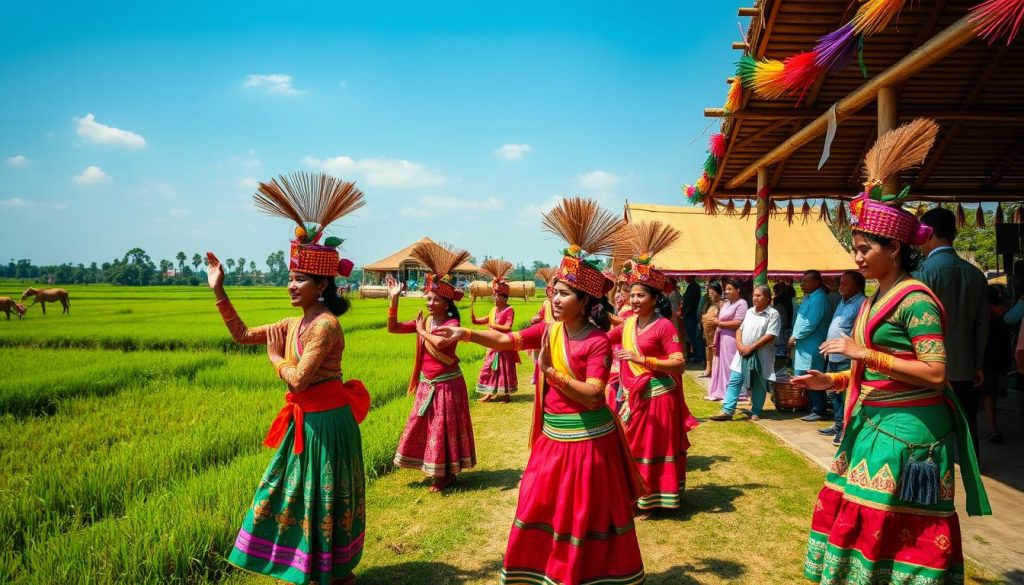
Explore the heart of Assamese culture through the lively Bihu festival. It’s a tradition that shows the beauty of seasonal changes and community unity. This festival happens three times a year, each time celebrating a different harvest season.
The Bihu festival is more than a party. It’s a deep way to connect with the land and people of Assam. Locals show their love for these festivals in unique ways.
- Rongali Bihu: Celebrated on April 14, marking the spring harvest and new year
- Kongali Bihu: An autumn observance reflecting agricultural challenges
- Bhogali Bihu: A winter festival commemorating the harvest season on January 15
At Rongali Bihu, you’ll see amazing cultural shows with traditional music and dance. People use special instruments like pepa, gogona, and dhol. It’s a time filled with joy and celebration.
“Bihu is not just a festival, it’s the soul of Assam dancing to the rhythm of life and nature.”
Traditional clothes are very important during these celebrations. Men wear dhoti and gamosa, while women wear beautiful mekhela sador. The fun includes tasty foods like pitha and laru, made with local ingredients.
| Bihu Type | Date | Key Characteristics |
|---|---|---|
| Rongali Bihu | April 14 | Spring harvest celebration |
| Kongali Bihu | October | Reflection of agricultural challenges |
| Bhogali Bihu | January 15 | Winter harvest festival |
By experiencing Bihu, you’ll learn a lot about Assamese culture. You’ll see how this tradition brings together community, agriculture, and spiritual beliefs in a beautiful celebration.
Silk Heritage: Exploring Sualkuchi Weaving Village
Sualkuchi is a village on the Brahmaputra River’s northern bank. It’s known as the “Manchester of Assam.” Here, the art of making Assamese silk has been passed down for generations.
Traditional Weaving Techniques
The Sualkuchi weaving village is famous for three types of silk:
- Muga Silk: Known as Golden Silk, prized for its natural golden sheen
- Eri Silk: Called Warm Silk, recognized as Ahimsa (non-violent) silk
- Pat Silk: A pure white silk with exceptional quality
Each silk type has its own cultural and technical tradition. For example, Muga silk gets more lustrous with each wash. It’s scientifically known as Antheraea assamensis.
Shopping for Authentic Assamese Silk
| Silk Type | Characteristics | Price Range |
|---|---|---|
| Muga Silk | Golden sheen, improves with washing | Highest price point |
| Eri Silk | Warm, non-violent production | Moderate pricing |
| Pat Silk | Pure white, delicate texture | Mid-range pricing |
In Sualkuchi, you’ll find beautiful silk products like the Mekhela Chador. It has designs like Japi, Miri Gos Butta, and Paro. Buying these products supports local artisans and keeps this ancient craft alive.
Sualkuchi: Where every thread tells a story of Assamese cultural richness and artistic excellence.
Adventure Activities in Nameri National Park
Nameri National Park is at the foot of the Eastern Himalayas. It’s a thrilling spot for those who love adventure. It’s on the border of Assam and Arunachal Pradesh, offering a unique experience.
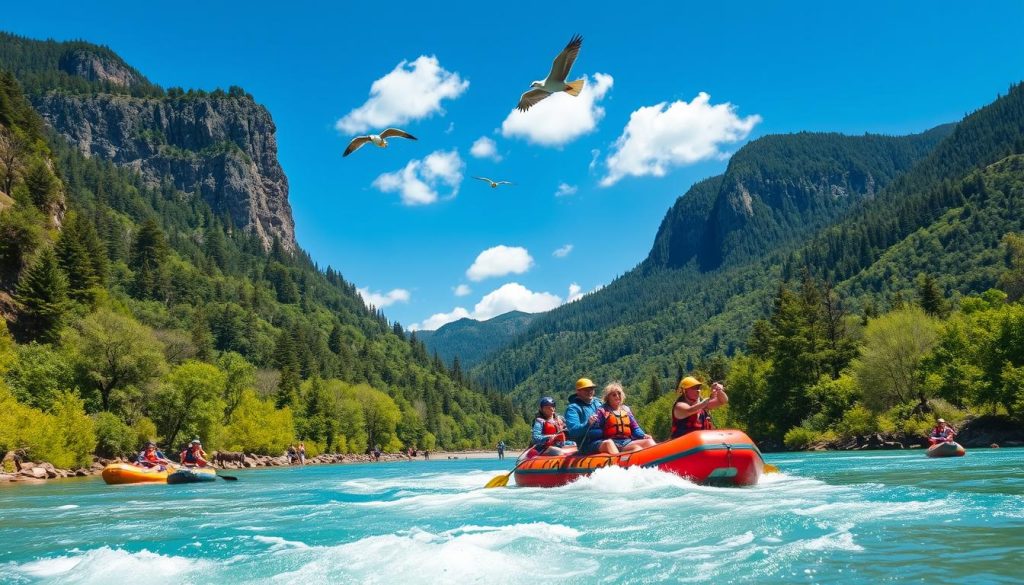
Your journey in Nameri starts with the Jia Bhorali River. It flows through the park, offering many fun activities:
- White-water rafting through challenging rapids
- Golden Mahseer fishing in pristine waters
- Bird-watching with over 300 species to spot
- Wildlife jeep safaris
- Nature walking trails
“Nameri is where adventure meets untouched natural beauty” – Local Adventure Guide
Nameri National Park is a top spot for adventure in Assam. It offers guided tours that are safe and eco-friendly.
| Activity | Difficulty Level | Approximate Cost (INR) |
|---|---|---|
| River Rafting | Moderate | 1500-2500 |
| Jeep Safari | Easy | 500 |
| Bird Watching | Easy | 300-500 |
| Fishing Expedition | Moderate | 2000-3000 |
The best time to visit Nameri National Park is from October to March. The weather is perfect for outdoor fun. Whether you love wildlife, nature, or thrill, this park offers an amazing journey through Assam’s beauty.
Culinary Journey Through Assamese Cuisine
Get ready to explore the amazing flavors of Assamese cuisine. Traditional Assam food is a unique culinary journey. It shows the region’s rich culture and diverse landscape.
Your taste buds will love the delectable dishes. They mix local ingredients with old cooking methods.
Traditional Dishes That Define Assamese Cuisine
Assamese cuisine is known for its unique flavors and cooking ways. Here are some dishes you must try:
- Khar: A signature alkaline dish made with raw papaya and lentils
- Machor Tenga: A tangy fish curry that shows local cooking’s essence
- Pitika: Mashed potato dish with mustard oil
- Duck roast with ash gourd
- Pork preparations with bamboo shoot
Exploring Local Food Markets and Restaurants
Visiting local markets and restaurants is key to exploring Assamese cuisine. Guwahati and Jorhat offer real dining experiences. They show the region’s food diversity.
| Dish Category | Key Characteristics | Popular Examples |
|---|---|---|
| Rice-based Dishes | Staple of Assamese diet | Pitha (rice cakes), Lai Xaak Bhaji |
| Non-Vegetarian Specialties | Rich and Flavorful | Duck Roast, Pork with Bamboo Shoot |
| Vegetarian Delights | Fresh and Nutritious | Khar, Mixed Vegetable Preparations |
“Assamese cuisine is a journey of flavors that tells the story of its land and people.” – Local Food Expert
Pro tip: Enjoy your meal with a steaming cup of Assam tea. It’s the perfect way to experience traditional Assam food. Each bite is a taste of the rich culinary traditions of Assamese cuisine.
Exploring Ahom Dynasty Heritage: Sivasagar
Stepping into Sivasagar is like entering a living museum. This city was the capital of the Ahom dynasty for 600 years. It’s filled with architectural wonders that show the advanced civilization of the time.
The Ahom dynasty’s legacy is seen in many landmarks:
- Rang Ghar: An iconic amphitheatre recognized as one of Asia’s oldest
- Talatal Ghar: A seven-storey palace with unique architectural design
- Shiva Dol: The tallest Shiva temple in India, standing 104 feet high
The architectural wonders in Sivasagar show amazing engineering skills. The Talatal Ghar, built from 1751 to 1769, has four above-ground and three underground floors. It was made with materials like sticky rice and swan eggs.
“Sivasagar is not just a city, but a time capsule preserving the grandeur of the Ahom kingdom.”
Exploring Sivasagar reveals the advanced engineering and culture of the Ahoms. The Rang Ghar’s courtyard was once the site of bullfights and wrestling, showing the lively royal life.
| Landmark | Unique Feature |
|---|---|
| Rang Ghar | Asia’s oldest amphitheatre |
| Talatal Ghar | Seven-storey palace with secret tunnels |
| Shiva Dol | Tallest Shiva temple in India |
At the Ahom Museum, you can learn more about the kingdom’s history. It has royal artifacts and stories of the kingdom’s legacy. Your visit to Sivasagar will give you a unique look into Assam’s rich past.
Conclusion
Exploring Assam tourism shows a place that’s more than just a trip. You’ll see wildlife in Kaziranga and Nameri National Parks and peaceful tea gardens in Dibrugarh. These experiences promise a memorable journey that awakens all your senses.
Assam’s variety invites you to dive into its cultural richness. You’ll learn about ancient traditions at the Bihu festival, visit spiritual sites like Kamakhya Temple, and take a cruise on the Brahmaputra River. Each experience shares a story of a place where nature and culture blend beautifully.
Assam offers many adventures, from wildlife photography in Kaziranga to weaving silk in Sualkuchi. You’ll also enjoy local foods like Pitha and Masor Tenga. Your memories will be filled with the warmth of locals, exciting wildlife, and the calm of its landscapes.
Looking back on your Assam trip, you’ll see it’s more than a place – it’s a life-changing experience. You’ll learn about the one-horned rhinoceros, intricate silk weaves, spiritual retreats, and delicious foods. Assam welcomes you to explore, connect, and find inspiration.
The above is subject to change.
Check back often to TRAVEL.COM for the latest travel tips and deals.
Here are some Tours & Sightseeing suggestions that might pique your interests!
